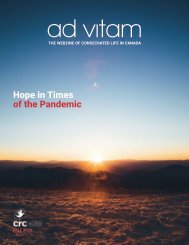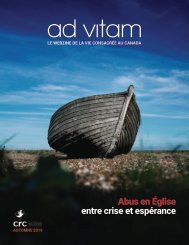ad vitam - Fall 2019
READING TIPS The ad vitam webzine is unique in its offer of an integral and interactive experience featuring articles and audio-visual content. We strongly suggest that you read it online, ideally on a computer or tablet (not recommended on a smartphone). To zoom in: on a computer, double-click or use the + and - found at the bottom-right of the screen; on a tablet, double-tap the screen. Use your mouse or finger to move throughout the page. It is possible to download a PDF of the webzine, however the file will not support links and audio-visual content. For environmental reasons, we invite you to limit printing of the PDF. You may contact us if you wish to obtain a text-only version of a specific article. We hope that as you acquaint yourself with our webzine over time, you’ll enjoy the enriching experience of its unique format. We welcome your comments and questions at info@crc-canada.org.
READING TIPS
The ad vitam webzine is unique in its offer of an integral and interactive experience featuring articles and audio-visual content. We strongly suggest that you read it online, ideally on a computer or tablet (not recommended on a smartphone). To zoom in: on a computer, double-click or use the + and - found at the bottom-right of the screen; on a tablet, double-tap the screen. Use your mouse or finger to move throughout the page.
It is possible to download a PDF of the webzine, however the file will not support links and audio-visual content. For environmental reasons, we invite you to limit printing of the PDF. You may contact us if you wish to obtain a text-only version of a specific article. We hope that as you acquaint yourself with our webzine over time, you’ll enjoy the enriching experience of its unique format. We welcome your comments and questions at info@crc-canada.org.
Create successful ePaper yourself
Turn your PDF publications into a flip-book with our unique Google optimized e-Paper software.
P ERSPECTIVES<br />
A bishop’s view<br />
Remarks by the Most Rev. Marc Pelchat, Auxiliary Bishop of Quebec<br />
Our Church has been plunged into a genuine<br />
crisis since we became aware of<br />
the scale of the sexual abuse of minors<br />
committed by priests, bishops and deacons, or<br />
other persons who h<strong>ad</strong> been given an ecclesial<br />
mission.<br />
This awareness also extends to vulnerable<br />
<strong>ad</strong>ults, in particular women religious abused<br />
by priests and poorly protected by their<br />
superiors.<br />
Sins unveiled and in the open, unbearable<br />
crimes, scandals that hurt all members of the<br />
Church—first and foremost, the victims—and<br />
our societies that expect better from religion.<br />
These abuses also demonstrate a dysfunction<br />
in the governance of our Church and in<br />
the exercise of the managerial ministry carried<br />
out by ordained ministers. These crimes are<br />
abuses of power, breaches of trust or abuses<br />
of conscience, and their concealment is not<br />
the least aspect of the scandal.<br />
These facts have been known by many people<br />
in charge for a few dec<strong>ad</strong>es, but their magnitude<br />
has been brought to the attention of most<br />
of us in the last few years, with an intensity<br />
that has shaken us. We cannot discharge ourselves<br />
of responsibility for this moral bankruptcy<br />
by considering that it is the work of only<br />
a part of our brothers, but we must recognize<br />
that we have a part of it and that we are<br />
engaged in a work of conversion, recovery and<br />
transformation.<br />
From awareness to responsibility<br />
Bishops and local churches must turn away<br />
from denial and silence to find ways to put victims<br />
first and to show concrete compassion<br />
for them by welcoming, listening and accompanying<br />
them towards healing.<br />
In Can<strong>ad</strong>a, we also need to be aware of the<br />
scandal of the residential schools for Indigenous<br />
children, which has long been erased<br />
from our collective memory. This result of a<br />
colonial policy in which ecclesial institutions<br />
were complicit contributed to a cultural genocide<br />
that also encouraged abuses.<br />
In our country, awareness dates back to the<br />
early 1980s with various cases of sexual<br />
abuse. The Can<strong>ad</strong>ian Bishops began to<br />
<strong>ad</strong>dress the issue in 1987, and in 1992 published<br />
the document From Pain to Hope with<br />
guidelines and recommendations. A few<br />
years ago, the CCCB (Can<strong>ad</strong>ian Conference of<br />
One of the great challenges remains healing,<br />
reconciliation and repair or amends,<br />
especially when the reporting occurs after<br />
a few dec<strong>ad</strong>es and the perpetrator is de<strong>ad</strong>.<br />
We meet victims, we offer support. However,<br />
some victims are asking for a more tangible<br />
reparation that is difficult for us to assess<br />
and grant. Our reality is also to work with<br />
insurers and legal counsel. In that respect,<br />
there is still a long way to go.<br />
10 • AD VITAM • FALL <strong>2019</strong>










